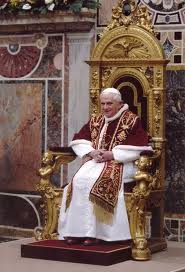In his traditional New Year’s address to the Holy See diplomatic corps, Pope Benedict XVI presented an overview of the state of the world, pointing out both problems and encouraging signs in a variety of areas.
 According to Vatican Insider, the pope began by speaking about the economic crisis that is gripping so many nations at the present time.
According to Vatican Insider, the pope began by speaking about the economic crisis that is gripping so many nations at the present time.
“The crisis can and should be a stimulus to reflect on human existence and the importance of its ethical dimension, even before the mechanisms that govern economic life,” he said, then added that we must “establish new rules that will assure that everyone has the opportunity to live with dignity and to develop their skills for the benefit of the entire community.”
The diplomats, representing nearly 180 countries, were also told that religious freedom is “the first of human rights, because it expresses the most fundamental reality of the person . . . In many countries, Christians are deprived of fundamental rights and relegated to the margins of public life; in others they suffer violent attacks against their churches and their homes. Sometimes they are forced to abandon the country that they helped to build, because of continuing political tensions and policies that often relegate them a secondary spectators in the life of the country.”
In other parts of the world, such as the developed west, the Pope cited policies that are “bent on marginalizing the role of religion in social life, as though it were the cause for the intolerance, rather than an appreciable contribution to education in respect of human dignity, justice and peace.”
On a more positive note, he mentioned the recognition of religious minorities in Georgia and a ruling by the European Court of Human Rights to allow crucifixes in Italian classrooms.
Some of his strongest words were on the subject of marriage and family. Echoing the theme of the World Day for Peace, the pope reiterated the importance of education, saying that “educational places” need to be preserved, particularly those of the family which is founded on marriage between a man and a woman.
“This is not just a social convention, but the basis for all societies. Therefore, policies that are detrimental to the family threaten human dignity and the very future of humanity.”
He went on to praise policies that enhance the family, such as a recent decision of the Court of Justice of the European Union, which “prohibits the patenting of processes related to human embryonic stem cells, as well as the resolution of the Parliamentary Assembly of the Council of Europe, that condemns prenatal selection based on sex.”
Looking especially to the Western world, the Pope said he was convinced that “we oppose the education of young people and thereby legislative measures for the future of humanity that not only allow, but sometimes even promote, abortion for reasons of convenience or questionable medical reasons.”
He had particularly poignant remarks about young people who are adversely affected by the uncertainty of the times such as those who are living in the turmoil of the so-called “Arab Spring.”
“Their malaise has originated the turmoil which in recent months has invested, at times heavily, the different regions. I am referring primarily to North Africa and the Middle East where young people who, among other things, suffer from poverty and the fear of unemployment and feel that there are no certain prospects, have launched what has become a vast movement that demands reforms and more active participation in political and social life.”
Even though it is still too early to make an assessment of the situation, the pope said it is clear that the initial optimism of the Arab Spring has “given way to recognition of the difficulties of this moment of transition and change, and it seems clear that the appropriate way to continue the path taken is by recognizing the inalienable dignity of every human being and their fundamental rights.”
Respect for the person, Pope Benedict said, “must be the focal point of institutions and laws, it must lead to the end of all violence and prevent the risk that the dutiful attention to requests from citizens’ and the social solidarity needed are transformed into simple tools for maintaining or regaining power.”
On Syria, the Holy Land and Iraq, he expressed “great concern” for the populations of these nations because of the ongoing tension and violence. He called for a “speedy end” to the bloodshed in Syria and a “fruitful dialogue” between politicians that could take place in the present of independent observers.
Peace between Palestinians and Israelis is also critical for stability in the Middle East and he praised an initiative taken by the Kingdom of Jordan for a resumption of the dialogue between the two nations.
The Pope also said he was following “with great attention the developments in Iraq, deploring the attacks that have, until recently, caused the loss of many lives, and I encourage its leaders to continue firmly on the road to a full national reconciliation.”
He went on to deplore the religiously motivated terrorism that claimed so many victims in 2011, especially in Asia and Africa, and reiterated how important it was that religious leaders “firmly and forcefully” repeat the message that violence “is not the true nature of religion. Instead, it is the misrepresentation that contributes to its destruction. Religion cannot be used as an excuse to bypass the rules of justice and law.”
Last, he touched upon a recurring theme of his pontificate, concern for the environment, about which he expressed his hope that the international community will prepare for the UN Conference on Sustainable Development (Rio +20) as an authentic “family of nations and, therefore, with a great sense of solidarity and responsibility toward present and future generations.”
© All Rights Reserved, Living His Life Abundantly®/Women of Grace® http://www.womenofgrace.com









